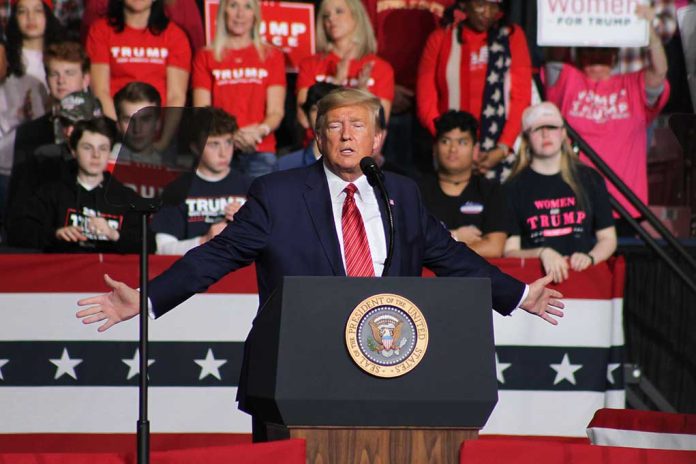
Chad fires back at the United States with visa restrictions, defiantly asserting national pride in response to President Trump’s expanded travel ban that targets 12 countries with “deficient” security protocols.
Key Takeaways
- Chad has suspended visa issuance to U.S. citizens in direct retaliation to President Trump’s travel ban affecting 12 countries including Chad
- President Trump’s new travel restrictions target nations with inadequate security vetting procedures, including Afghanistan, Myanmar, Chad, Congo, Equatorial Guinea, Eritrea, Haiti, Iran, Libya, Somalia, Sudan, and Yemen
- Chadian President Mahamat Idriss Deby emphasized national dignity and sovereignty in his decision despite limited resources
- Additional restrictions will be imposed on seven more countries, highlighting the administration’s commitment to strengthening border security
- The diplomatic standoff illustrates the international ripple effects of America’s immigration policy enforcement
Chad’s Defiant Response to America’s Travel Ban
The African nation of Chad has taken decisive action against the United States, announcing a temporary suspension of visa issuance to American citizens. This move comes as a direct countermeasure to President Trump’s recently implemented travel ban affecting citizens from 12 countries, including Chad. The proclamation, which took effect immediately, represents a significant diplomatic pushback from the central African nation and demonstrates the international consequences of the administration’s enhanced immigration enforcement policies.
President Mahamat Idriss Deby Itno made the announcement via official channels, framing the decision as a matter of national sovereignty and dignity. The Chadian leadership specifically referenced the U.S. travel restrictions as the catalyst for their reciprocal action, establishing a clear cause-and-effect relationship between American policy and their response. This development marks a notable escalation in tensions between the two nations at a time when international cooperation on security matters remains crucial.
Trump’s Enhanced Travel Ban Details
President Trump’s newly reinstated travel ban targets 12 countries identified as having insufficient vetting procedures for their citizens seeking entry into the United States. The comprehensive restrictions apply to Afghanistan, Myanmar, Chad, the Republic of Congo, Equatorial Guinea, Eritrea, Haiti, Iran, Libya, Somalia, Sudan, and Yemen. The administration cited national security concerns and deficiencies in information-sharing as primary justifications for the expanded policy, which fulfills a key campaign promise to strengthen America’s borders.
“Chad has no planes to offer, no billions of dollars to give but Chad has his dignity and pride,” said Mahamat Idriss Deby, President of Chad
Beyond the initial 12 countries facing complete restrictions, seven additional nations will see heightened entry requirements beginning Monday. The administration has implemented a phased approach, allowing for diplomatic engagement while still prioritizing American security interests. This multi-tiered system reflects a strategic enforcement mechanism designed to incentivize foreign governments to improve their security protocols and information-sharing capabilities with U.S. authorities.
Diplomatic Fallout and Foreign Reactions
Chad’s response highlights the diplomatic challenges created by stricter immigration policies, with President Deby emphasizing the principle of reciprocity in international relations. Unlike wealthier nations that might leverage economic incentives, Chad’s leadership framed their response in terms of national honor. This sentiment was explicitly expressed in the president’s statement that underscored Chad’s limited resources but unwavering commitment to defending its sovereignty against perceived inequitable treatment.
“Chad has neither planes to offer, nor billions of dollars to give, but Chad has its dignity and its pride.” – President Mahamat Idriss Deby Itno
Other affected nations have responded differently to their inclusion in the travel ban. The Republic of Congo, through government spokesperson Thierry Moungalla, suggested their inclusion resulted from a misunderstanding, stating, “Obviously, Congo is not a terrorist country, is not home to any terrorist, is not known to have a terrorist vocation.” Meanwhile, Sierra Leone, facing heightened but not complete restrictions, has taken a more conciliatory approach, with President Chernor Bah pledging to “work with U.S. authorities to ensure progress” on addressing security concerns.
Implications for America-First Foreign Policy
The travel ban and Chad’s retaliatory measures exemplify President Trump’s America-first approach to foreign policy and immigration enforcement. By prioritizing domestic security concerns over potential diplomatic friction, the administration has demonstrated its commitment to campaign promises regarding stricter border control and enhanced vetting procedures. The implementation of these policies reflects a fundamental shift from previous administrations’ approaches to international engagement, emphasizing security and sovereignty as paramount concerns.
The developing situation highlights the complex interplay between domestic security policy and international relations. As additional countries consider their responses to America’s travel restrictions, the diplomatic landscape may continue to evolve. The administration’s willingness to accept some diplomatic turbulence in service of enhanced security protocols reinforces President Trump’s consistent message that American safety takes precedence in policy formulation, regardless of potential international pushback or criticism from global institutions.







